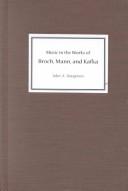
Music in the works of Broch, Mann, and Kafka
By John Hargraves
Subjects: Knowledge, German literature, Broch, hermann, 1886-1951, Mann, thomas, 1875-1955, Music, Knowledge and learning, Music in literature, Songs and music, History and criticism, Kafka, franz, 1883-1924, German literature, history and criticism, 20th century
Description: "The German Romantic critic Friedrich Schlegel saw music as a paradigm of art, and wished to bring the qualities of music to literature. Schopenhauer saw in music a direct manifestation of the Will, and thus considered it the highest form of art. This study examines the ironic influence of these and similar ideas of music's primacy among the arts on three of the most important modern writers of German: Hermann Broch, Thomas Mann, and Franz Kafka. Of the three, Broch takes Schlegel's idea furthest: His novel The Death of Vergil uses the constructive techniques and sonorities of music to extend the cognitive reach of his writing to the non- or supraverbal, and Hargraves traces similar concerns across Broch's career. Unlike Broch, Mann saw in musicality a peculiarly German access to the dark forces within the human psyche. Music is the "glass" through which the reader sees the development of the anti-hero Hans Castorp in Mann's Magic Mountain. In Doktor Faustus, on the other hand, the hero Leverkuhn conjures with demonic powers to create fictional music; his "strict style" is itself an allegory of the political realities of the twentieth century. Kafka admitted that he had little appreciation for music, but two of his important shorter works, "Josefine the Singer" and "Investigations of a Dog," transform this "unmusicality" into an enigmatic essay on the uses and limits of art. Hargraves uncovers surprisingly parallel concerns among these three very different writers."--BOOK JACKET.
Comments
You must log in to leave comments.